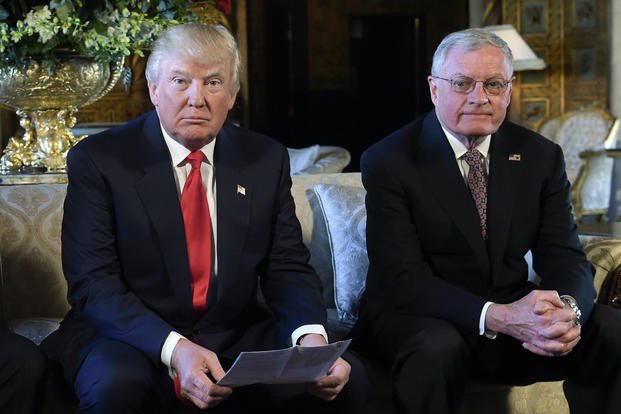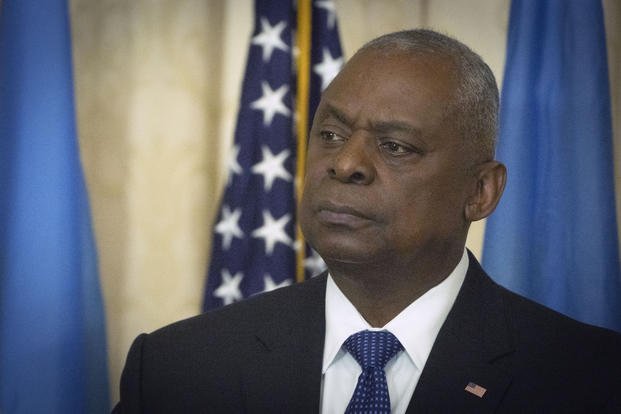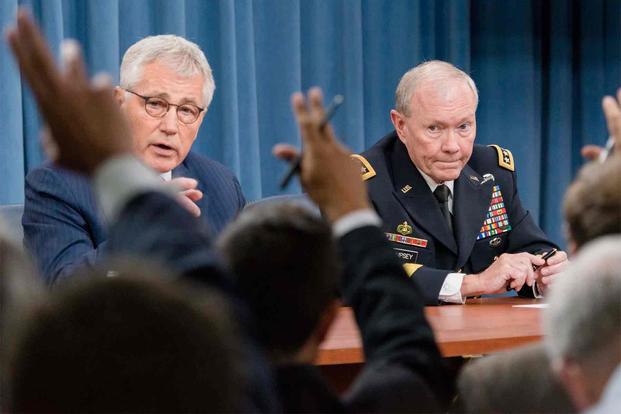Trump Is Likely to Name a Loyalist as Pentagon Chief After Tumultuous First Term

WASHINGTON -- President-elect Donald Trump's[1] choice for defense secretary is still up in the air, but it is a sure bet he will look to reshape the Pentagon and pick a loyalist following his tumultuous first term. Five men held the job as Pentagon chief only to resign, be fired or serve briefly as a stopgap.
While he has yet to announce a decision, the names of potential Pentagon chiefs stretch from the well-known -- such as Rep. Mike Waltz of Florida -- to an array of former administration loyalists, including retired Lt. Gen. Keith Kellogg, who held national security posts during Trump's first term.
Former Secretary of State Mike Pompeo had been floated, but Trump said on social media Saturday that Pompeo would not be joining the new administration.
Some decisions may linger for days as candidates jostle for attention and officials wait for the final results from House races[2], weighing whether Republican lawmakers can be tapped or if others are a safer pick to avoid a new election for an empty congressional seat.
"The choice is going to tell us a lot about how he will deal with the Pentagon," said Mark Cancian, senior adviser with the Center for Strategic and International Studies and a retired Marine colonel.
He said someone like Waltz -- a former Army[3] officer and Green Beret -- with a deep military background may not be as dramatic of a change as others who may be viewed as stronger Trump loyalists.
With a number of top jobs at the State Department, National Security Council and Defense Department up for grabs, Trump is expected to lean toward those who back his desire to end U.S. involvement in any wars[4], use the military to control the U.S.-Mexico border[5] and take a hard line on Iran[6].
The key test, however, will be loyalty and a willingness to do whatever Trump wants, as he seeks to avoid the pushback he got from the Pentagon the first time around.
Trump's relationship with his civilian and military leaders during those years was fraught with tension, confusion and frustration, as they struggled to temper or even simply interpret presidential tweets and pronouncements that blindsided them with abrupt policy decisions they weren't prepared to explain or defend.
Time after time, senior Pentagon officials -- both in and out of uniform -- worked to dissuade, delay or derail Trump, on issues ranging from his early demand to prohibit transgender troops from serving in the military and his announcements that he was pulling troops out of Syria[7], Iraq and Afghanistan[8] to his push to use troops to police the border[9] and stem civil unrest on the streets of Washington[10].
In his first administration, Trump hewed toward what he considered strong military men and defense industry executives. Initially enamored with generals, Trump over time found them to be not loyal enough.
"He soured on them," Cancian said. "They were not as pliable as he had thought. ... I've heard people speculate that maybe the chairman would be fired. So that's something to watch."
Air Force[11] Gen. CQ Brown, took over as chairman of the Joint Chiefs of Staff in October 2023 for a four-year term, but military leaders serve at the pleasure of the president. Brown, a combat pilot and just the second Black officer to serve as chairman, spoke out after the police killing of George Floyd, describing the bias he faced in his life and career.
Trump also is expected to choose someone as defense secretary with disdain for equity and diversity programs[12] and less likely to counter his plans based on limits laid out in the Constitution and rule of law. But he also may well push for increased defense spending, at least initially, including on U.S. missile defense.
A key overriding concern is that Trump will select someone who won't push back against potentially unlawful or dangerous orders or protect the military's longstanding apolitical status[13].
On Thursday, Defense Secretary Lloyd Austin raised that red flag. In a message to the force, he said the U.S. military stands ready to "obey all lawful orders[14] from its civilian chain of command," adding that troops swear an oath to "support and defend the Constitution of the United States."
He echoed retired Army Gen. Mark Milley's pronouncement during a speech as he closed out four years as chairman of the Joint Chiefs.
"We don't take an oath to a king or a queen or to a tyrant or a dictator. And we don't take an oath to a wannabe dictator," Milley said. "We don't take an oath to an individual. We take an oath to the Constitution, and we take an oath to the idea that is America, and we're willing to die to protect it."
Trump's first defense chief, retired Marine Gen. Jim Mattis, learned quickly to stay off his boss' radar by largely eliminating press conferences that Trump could see.
Mattis and Milley, along with Trump's chief of staff John Kelly, a retired Marine general, and retired Marine Gen. Joseph Dunford, who also served as Joint Chiefs chairman, all worked quietly behind the scenes to temper some of Trump's decisions.
They stalled his demands that troops be quickly and completely withdrawn from Iraq, Syria and Afghanistan and managed to prevent the use of active-duty troops to quell civil unrest in Washington.
Two years in, Mattis abruptly resigned[15] in December 2018 in frustration over Trump's national security policies, including a perceived disdain for allies and his demands to pull all troops out of Syria. Patrick Shanahan, the deputy defense secretary, took over as acting Pentagon chief but withdrew as the nominee six months later due to personal family problems that were made public.
Then-Army Secretary Mark Esper took over in an acting role, but he had to step aside briefly when nominated, so Navy[16] Secretary Richard Spencer served as the acting chief until Esper was confirmed.
Esper was fired days after Trump lost the 2020 election[17], largely because the president did not believe him to be loyal enough. Trump was especially angry over Esper's public opposition to invoking the two-centuries-old Insurrection Act to deploy active-duty troops in the District of Columbia during unrest following the police killing of George Floyd.
Trump named Christopher Miller, a retired Army officer who has been director of the National Counterterrorism Center, to serve as acting secretary and surrounded him with staunch loyalists.
That is the Pentagon that officials quietly say they expect to see in Trump's new administration.
© Copyright 2024 Associated Press. All rights reserved. This material may not be published, broadcast, rewritten or redistributed.
 When a hillside full of Germans threatened to annihilate Army Pfc. Foster Joseph Sayers' exposed company in France during World War II, he took action and singlehandedly killed about a dozen enemy soldiers to help his comrades survive. Sayers lost his life
When a hillside full of Germans threatened to annihilate Army Pfc. Foster Joseph Sayers' exposed company in France during World War II, he took action and singlehandedly killed about a dozen enemy soldiers to help his comrades survive. Sayers lost his life

